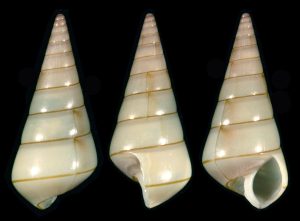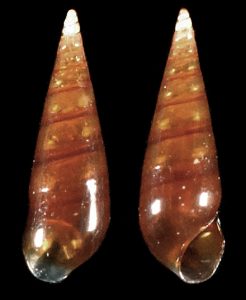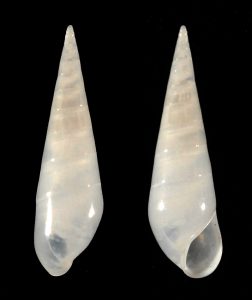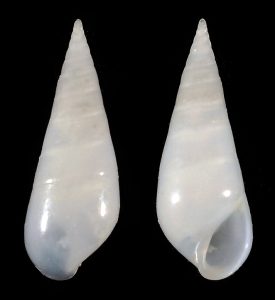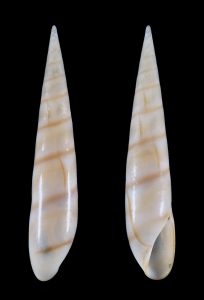Family Eulimidae
Shell size to 14 mm; shell conical, smooth, sometimes very glossy, with up to 11 whorls, protoconch small, dome-shaped. Color whitish, with thin red-brown band just above suture. The species is known to occur in deeper water in the Gulf of Mexico. The shell illustrated, measuring about 10 mm, was found by Steve Rosenthal on Turner Beach, Captiva, on December 20, 2016. It was identified originally as Niso aegles Bush, 1885, which is most likely a separate species.
Read MoreShell to 5 mm, slender, lanceolate, with gradually increasing diameter. Flat whorls. Fine axial lines visible under high magnification. Uniformly golden-mahogany brown. The type locality for this species is Cedar Keys, on Florida’s Gulf coast. The shell illustrated was collected by Phyllis Sharp on Sanibel in 2014.
Read MoreShell size to 8 mm, shell delicate, straight-sided, with very transparent, minute protoconch. Aperture elongated, flaring at its base. This species is more delicate than similar Melanella eburnea, which also occurs in SW Florida. As with many members of the Eulimidae, shells of live snails (or fresh-dead) are translucent, becoming opaque after death of the animal. Snail tentacles have each a red band, which is interrupted around the eye. Picture of the live slender eulima was taken by the late Smithsonian photographer Chip Clark in the Bahamas, during the 1999 Shell Museum/Smithsonian Deep-sea Expedition.
Read MoreShell size to 11 mm, shell white, highly glossy. Protoconch pointed, sometimes tilted. Shell straight sided, sometimes slightly curved. Outer lip not flared in lateral view. Do not confuse with co-occurring species Melanella hypsela, which has a more delicate shell with a flaring (in lateral view) outer lip. Sometimes with slightly wider body whorl (as in the illustration). Immature shells with angled body whorl periphery.
Read MoreShell size to 10 mm; shell very slender, narrow, pointed, surface very glossy, slippery. Protoconch translucent, very small. Whorl profile slightly convex. Aperture elongated. Two golden-brown spiral bands are diagnostic of this species.
Read More